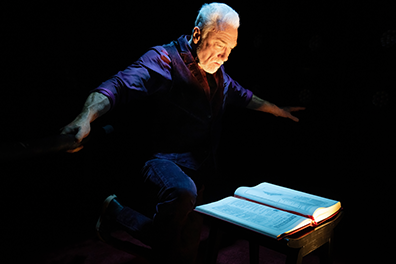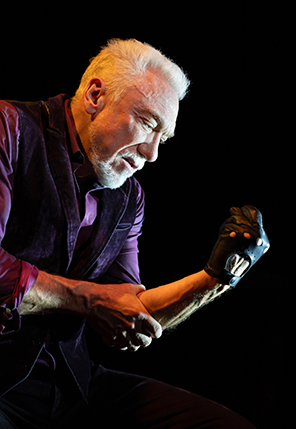All the Devils are Here: How Shakespeare Invented the Villain
Staring Into the True Face of Evil
Created by Patrick Page
Shakespeare Theatre Company, Klein Theater, Washington, D.C.
Saturday, December 7, 2024, G–111 (middle stalls)
Thursday, December 26, 2024, D–112 (front center stalls)
Directed by Simon Godwin

Patrick Page performs in All the Devils Are Here: How Shakespeare Invented the Villain, his one-actor show demonstrating in performance how William Shakespeare evolved his portrayal of villains from stock characters to true humans over the course of the canon. Photo by Julieta Cervantes.
A black chair sits in the corner of our basement. Made of wood with cushioned seat and back, it is starkly simple, narrow and tall: 18 inches wide at the front of the seat tapering to a 14-inch back rising four and a half feet from the ground. It looks like an ancient throne because it was, truly, Macbeth's throne; it even has knife slashes in the back cushion where Macbeth stabbed at his late best buddy, Banquo. Being a ghost, Banquo wasn't actually sitting there, so Macbeth's blade tore through his throne's vinyl cushion and cracked its wood frame.
That's how much Patrick Page was into Macbeth when he played the titular part in the Shakespeare Theatre Company's 2004 production of William Shakespeare's play in Washington, D.C. That throne, which my wife and I purchased at a props and costumes sale, is not the only connection I have with Page and Macbeth, as revealed in Page's one-actor show All the Devils are Here: How Shakespeare Invented the Villain. The subtitle for Page's show is instructive to its 90-minute substance. In a tour de force repertoire of performances featuring a canon's worth of villains, Page demonstrates how Shakespeare turned a stock theatrical character into real people.
People like us.
Page is a veteran Shakespeare actor in regional theaters and a veteran villain on Broadway. He received a Tony nomination and Grammy Award playing Hades in Hadestown, and his portrayal of the Green Goblin was one of the few redeeming qualities of Spider-Man: Turn Off the Dark. Over his career, Page played several Shakespeare villains in canon chronological order, and he realized how these evil people were written with more psychological depth as Shakespeare matured. Page developed All the Devils are Here out of that observation, and Simon Godwin, who in 2023 directed Page as King Lear at the Shakespeare Theatre Company, agreed to helm the work for an Off-Broadway tryout. It earned Drama Desk, Outer Critics Circle, and Lucille Lortel awards for Outstanding Off-Broadway Solo Performance. The production hit the road last fall, starting at the Guthrie Theater in Minneapolis before moving to DC over the holidays. This spring it will have a three-week run at Broad Stage in Santa Monica, California.
This is not a TED Talk, though the subject matter merits the label. Godwin guides Page's observances and sampling of Shakespeare-penned evil into a theatrically immersive experience. Scenic Designer Arnulfo Maldonado's set is a lighting grid resembling a cage in the center of the stage. Inside is a black metallic-looking desk and matching chair (perhaps made of wood) and a gold skull sitting on the desk. Toward the front of the stage is a small table with an open book, and on either side of the light rig walls are pillars containing props that Page will use for his villainous succession of scenes. A red curtain spans the back of the stage.
For all the characters Page plays in this show, one of the most dynamic characterizations emerges in the brilliant lighting design of Stacey Derosier. Using spots from multiple angles, a mix of color gels, and stark shadows, Dorosier sets visual moods working in tandem with Page's matrix of evil personages. It is Dorosier and sound designer Darron L. West who deliver the production's first disturbing shivers when, out of total darkness and an uneasy aural environment, a low spot comes up on Page, kneeling by the table at the front of the stage. His right leg is splayed at a 90-degree angle to his side, his right hand holds a staff, his left hand is placed on the book, and his visage wields Trumpian anger. The spot creates a silhouette shadow on the red curtain, a large, threatening force emanating from Page himself. Suddenly, Page slams the staff on the floor three times like an ominous door knock echoing out through the theater. "Come, you spirits that tend on mortal thoughts," He starts and speaks Lady Macbeth's "unsex me" speech, ending with,
Come thick night,
And pall thee in the dunnest smoke of hell,
That my keen knife see not the wound it makes,
Nor heaven peep through the blanket of the dark
To cry, "Hold, hold."
It is an incantation—whether blessing or curse—for the show.
Page's expression gives way to a smile. "Do these words frighten you?" he asks the audience. "They scare the hell out of me. They scare the hell into me, which is its purpose." On his December 26 performance, Page ended the speech with "Merry Christmas!" and after boisterous—and relieved—applause from the audience, he glided into his question.
This is, in fact, a fun show. The hints are there in the pre-show soundtrack of devil-themed music: Bessie Smith's "Devil's Gonna Get You," Leonard Cohen's "You Want It Darker," The Rolling Stones' "Sympathy for the Devil," and, yep, Charlie Daniels' "The Devil Went Down to Georgia." Jim Croce's "Bad, Bad, Leroy Brown" gets both a spot in the music lineup and a shout-out in Page's play.
The humor is mostly contained to Page's narrative of how Shakespeare "invented" the villain. His thesis is biographical in foundation, starting with the young Shakespeare, son of Stratford-Upon-Avon's mayor, watching touring players perform in town. The most popular character was Vice, sewing chaos and comedy in the plot until good defeats him. As Shakespeare attained growing fame in early 1590s London, Page details three near contemporary references to the young playwright from the sticks:
- The published diatribe in 1592 by playwright Robert Greene calling the actor-turned-playwright Shakespeare a beautified, feather-stealing "upstart crow" (Page takes heart in Shakespeare receiving a bad review);
- A 1601 entry in the diary of a law student and obvious Shakespeare fan reporting that Shakespeare once intervened in a rendezvous between a lady of means and his lead actor, Richard Burbage then playing Richard III ("William the Conqueror came before Richard III");
- An account first recorded around 1700 of a supposedly established legend that a teen-age Shakespeare was arrested for poaching dear on a Warwickshire lord's land.
"In every one of these tales—the seduced lady, the deer, the plagiarism—there is one common thread," Page says: "Shakespeare was a thief."
Page traces Shakespeare's compositional competition with Christopher Marlowe as the two playwrights tried to out-evil each other in their plays, advancing villainy from the Vice character to stereotypical depictions of evil: people of other cultures (namely Jews), people of color, people born out of wedlock, and people with deformities. After Marlowe's death in 1593, Shakespeare gradually shifted from using common stereotypes to building his villains from the inside out. "He gave them back stories," Page says, thus creating a new genre of villains: real people. This path takes Shakespeare to such a dark state that the playwright turns away from tragedies to romances toward the end of his career, whereupon he creates a character that could be described as the antivillain.
This is Page's take. It also is his personal professional experience.
In Page's performance, this biography never lacks for entertainment or interest. His illustrative examples are a stunning display of a single actor playing nine all-star Shakespearean villains plus a designated hitter from Marlowe's canon. Vice is not one of these, but not to blame Page. His Vice is probably an accurate rendition of the minor league standard of 1570s acting conventions. He wears a red commedia dell'arte mask, smacks a tambourine on each line, is as stiff in pose as he is in line reading, and sounds like a recording of a Halloween demon greeting tricker-or-treaters.

Patrick Page enacting Richard, Duke of Gloucester, in his one-actor performance of All the Devils Are Here: How Shakespeare Invented the Villain. Photo by Julieta Cervantes.
Leading off Shakespeare's portrayals with Richard of Gloucester (later Richard III), Page says, "Richard was born to be bad," and he's speaking literally. His evidence comes from Richard's soliloquy in Henry VI, Part 3. Firmly establishing that he has "neither pity, love, nor fear" in murdering Henry VI (not his first killing), Richard goes on to describe his birth: legs first, with teeth, and crooked back. Page physically transforms while vocally driving the visual image of each line: rearranging his legs into awkward angles, then twisting an arm into reverse direction, finally contorting his shoulders into unequal planes. "Shakespeare took that Vice character and made him human," Page says. "And made him sexier."
Page moves on to the cultural "other" nature of villainy with the first of four character couplings in his one-man show: Aaron the Moor of Shakespeare's Titus Andronicus and Barabas of Marlowe's The Jew of Malta debating who is the baddest man in town. It's not a back-and-forth conversation but speeches. Barabas describes all his trickery—some of them fatal—and landing on the villainy of usury. Aaron boasts of his brutality, from ravishing maids and killing cows for the fun of it to digging up "dead men from their graves, and set them upright at their dear friends' doors, even when their sorrows almost were forgot." Notably, in this first string of villainy, the characters embrace their stereotypes: Richard his deformity, Aaron his blackness, Barabas his Jewishness.
Leaping from Marlow's villainous Jew to Shakespeare's Jewish villain, Page engages another comparative confluence of villainy. The Merchant of Venice's Shylock, Page says, represents the vital shift in Shakespeare's portrait of villains: it's not what they are, but who they've become through social pressures, ambition, or lust. The other character in the scene, Antonio the merchant, is not what would typically be considered a villain—unless you're Shylock. Page puts on a fur-collared overcoat and yarmulke and plays both Shylock and Antonio negotiating the bond, a scene that Page merges into Shylock's "Hath not a Jew" speech. Page has never been cast as Shylock but lists the role as one he "most wants to play." He makes the most of this brief moment, presenting one of the most mesmerizing Shylocks I've ever seen, delivering his words with cynical wisdom that needles Antonio. In playing Antonio's side of the conversation, Page shows us how Shylock is getting under the racist merchant's skin.
Page delves further into the human nature of villainy with Hamlet's Claudius, and chooses the aborted prayer scene. It is the moment Hamlet finally reaches the point where he is determined to carry out his revenge on his murdering stepfather but pauses when he finds Claudius praying. With that scene, in which Page plays Claudius trying to pray, Shakespeare makes sure both his hero and villain had a knowledge of right and wrong.
Page's next solo duet performance features excerpts from Othello. Page points out that Iago, in his seven soliloquies, always presents excuses for the evil he is perpetuating. Page counters by reading off the checklist for psychopathy diagnosis developed by Robert D. Hare in 1972. Each item fits Iago to a tee. However, Page doesn't perform any of the soliloquies. Instead, he presents Iago weaving his lethal web around Othello's psyche, editing the succession of scenes into one condensed passage. He plays Iago and Othello in back-and-forth conversation—even to the point of interrupting each other—as completely different characters in accent, tone, register, flow, and physical stature. A psychiatrist coming upon Page rehearsing might diagnosis the actor with schizophrenia.
In Martha Stout's 2006 book The Sociopath Next Door, the clinical psychologist writes that one in every 25 people possesses no conscience; they are sociopaths. Page does the Klein Theatre seating math and figures out that some 30 people in the audience are sociopaths. "You could be the wizard of Wall Street, an Academy-award winning producer, or president of the United States," Page says, then quickly adds, "I didn't say which one." He ends this portion pointing out how Shakespeare had now reversed the traditional physiognomy of evil: Othello with dark skin is loyal, loving, and noble; white Iago is rotten to the core.

Patrick Page enacting Prospero, in his one-actor performance of All the Devils Are Here: How Shakespeare Invented the Villain. Photo by Julieta Cervantes.
Page doesn't take this point further, but his samples show that Shakespeare knew that evil has nothing to do with skin color, or immigrant status, or spiritual beliefs either, even if so much evil is manifested in the name of various religions. After all, among the most hateful, greedy, and murderous practitioners of evil through the ages have professed themselves Christians, a religion founded on The Beatitudes and the principle of "love your neighbor as yourself"—neighbor being specifically portrayed by Jesus Christ as a Samaritan, the "other" in the Israeli society of his day, (Luke 10:27–37).
Which brings us to the next and, for me, one of the scariest of Shakespeare's villains in Page's presentation: Measure for Measure's Angelo, the ultra-fundamental Christian deputy duke of Vienna. When the novice nun Isabella appeals the death sentence of her brother—his crime was impregnating his fiancée before they were legally married—Angelo discovers himself lusting for Isabella and determines to trade sex with her for commuting her brother's death sentence. Page performs two passages from the play, pointing to how notoriously prescient Shakespeare's characterization of such villainy has become in modern society and politics. The first is Angelo's soliloquy where he knows what he's about to do is wrong, but he just can't resist. Holding the cross that Page's Claudius had tried to pray to in the previous scene, Angelo puts the blame on Isabella for being so, well, lustworthy. Page pairs this moment with Angelo's lines after he has revealed his intentions to Isabella.
And now I give my sensual race the rein:
Fit thy consent to my sharp appetite;
Lay by all nicety and prolixious blushes,
That banish what they sue for; redeem thy brother
By yielding up thy body to my will;
Or else he must not only die the death,
But thy unkindness shall his death draw out
To lingering sufferance.
Speaking this, Page takes Angelo to a place I've never seen any other actor go: he takes off his scarf and wraps each end in his fists as if ready to restrain her. This gesture links Angelo's justification for violence in this speech with his blame game in the soliloquy.
Page, however, proposes that the scariest villain in Shakespeare's canon may be the unnamed captain in King Lear, who accepts Edmund's order to kill Lear and his daughter Cordelia after they've been captured in battle and taken to prison. "I cannot draw a cart, nor eat dried oats. If it be man's work, I'll do't," the captain says as a good enough reason for committing murder. The promise of a better life is a mighty lure for doing evil.
Which brings us to Page's presentation of the Macbeths. "Their tragedy is not that they are naturally evil, but that hand-in-hand they choose evil," he says. As he did with Iago and Othello, Page plays both characters through a throughline of condensed scenes, soliloquies, and dialogues. The sequence illustrates how, time after time, the couple individually or at the urging of the other choose to commit a crime combining two of the greatest sins of their historical setting: kill a king when he is a guest in their home. Macbeth stumbles through his passage to evil, Page capturing the uncertainty that comes with the tug-of-war between his fervent ambition and devotion to honor. Meanwhile, Page's Lady Macbeth, from the moment she learns of the witches' foretelling Macbeth will be "king hereafter," determines to get her husband to hereafter by the quickest means possible. She sets to a strategy of conniving Macbeth with not-so-subtle looks and tones, erupting into frustration when he shows doubt. Unfortunately, these dual portrayals suggest that if it be man's work, Page's performance is true; if it be women's work, he's not quite as convincing.
Page could end with Macbeth. After all, he believes Shakespeare had gone so deep into dark evil with the play that the playwright didn't want to revisit that realm again. And Page speaks to that "dark place" from personal experience. "Playing that character can be terrifying," he says. "I have all their darkest qualities in me." Then he quotes a line from Shakespeare's The Tempest: "Hell is empty and all the devils are here," and pokes a finger at his chest. "That's a scary thought," he says.
Yet, it is in The Tempest, Shakespeare's last solo outing as playwright, where the ultimate lesson of Page's show manifests: "The rarer action is in virtue than in vengeance." Page follows Shakespeare there to the mysterious island where Prospero, the banned duke of Milan and a well-practiced wizard of dark magic, is determined to take revenge on his brother who betrayed him and the King of Naples who invaded Milan and exiled Prospero and his toddler daughter. But on the words of Arial, a spirit of air who would take pity on the purposed victims "were I human," Prospero chooses forgiveness.
Page ends his play where he began: kneeling on the stage, one hand on his book and the other holding his staff and pounding it three times on the floor. This time he recites the "Ye elves" speech from The Tempest and breaks his staff. This speech is clearly an incantation of blessing. All the devils are here—or at least 30 by Page's count. There are many more angels, however, and they almost always get the last word.
Eric Minton
February 2, 2025
Comment: e-mail editorial@shakespeareances.com
Start a discussion in the Bardroom


